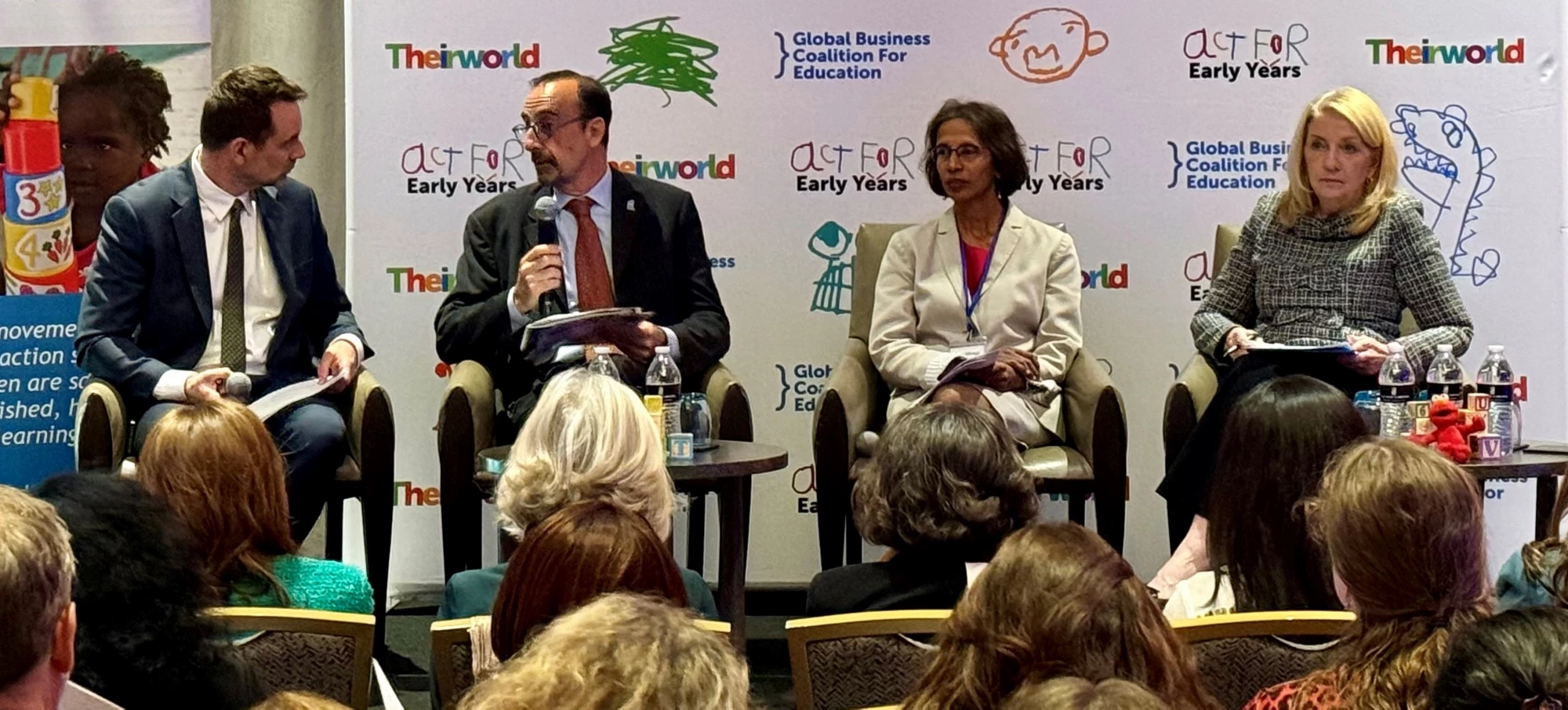 Caption (From left to right): Justin W. van Fleet, President, Theirworld, Luis Benveniste, Global Director, Education, World Bank, Bama Athreya, Deputy Assistant Administrator, USAID, and Catherine Russell, Executive Director, UNICEF, speaking at an event held on the sidelines of the IMF/World Bank Spring Meetings. Copyright: World Bank / Stefano De Cupis
Caption (From left to right): Justin W. van Fleet, President, Theirworld, Luis Benveniste, Global Director, Education, World Bank, Bama Athreya, Deputy Assistant Administrator, USAID, and Catherine Russell, Executive Director, UNICEF, speaking at an event held on the sidelines of the IMF/World Bank Spring Meetings. Copyright: World Bank / Stefano De Cupis
“You cannot be serious about education without investing in pre-primary education,” said the Rt. Hon Gordon Brown, United Nations Special Envoy for Education at the Act For Early Years: Unlocking Investment for Our Youngest Learners event on the sidelines of the 2024 IMF/World Bank Spring Meetings.
We couldn’t agree more. We know that investing in the early years is one of the smartest things a country can do to eliminate extreme poverty, boost shared prosperity, and create the human capital needed for economies to diversify and grow. Both brain science and economic evidence tell us that early childhood experiences have a profound impact on brain development.
Quality early childhood education (ECE) can also be an equalizer, reducing the gap in foundational skills between children from poorer homes and their more affluent peers, which is often stark by age three and widens as children progress through the school system—unless children receive the right stimulation.
Yet, despite the overwhelming evidence of the value of ECE, today too many children either do not have access to ECE or are enrolled in services of insufficient quality to unlock their potential. The global measure for learning poverty, or the proportion of 10-year-olds who cannot read and understand a simple text, has increased to 70% in low- and middle-income countries. Learning poverty begins early, which means our efforts to address it must also begin early.
Advocating for increased funding
In recognition of this, the global children’s charity Theirworld has been advocating for aid donors and national governments to commit 10% of their education spending to ECE since 2017. Theirworld’s quest, through the Act for Early Years campaign, is to mobilize $1 billion in additional funding from the public and private sector to deliver for the world’s youngest children. The campaign brings together a diverse set of partners driving progress on early childhood development and education, ranging from Sesame Workshop, UNICEF and the Early Childhood Development Action Network to the Conrad N. Hilton Foundation, Dubai Cares, and the Scaling Up Nutrition movement.
To track progress, Theirworld, working with the Research for Equitable Access and Learning (REAL) Centre at the University of Cambridge and experts Pauline Rose and Asma Zubairi, publishes annual donor scorecards presenting the latest data available on ECE investment. The latest report launched at the event, A Turning Point, shows that the amount spent on pre-primary education in 2022 was $282.3 million, the highest since records began in 2002. The increase in aid between 2021 and 2022 is driven by the World Bank, which invested $181 million in pre-primary education in 2022. Overall, aid spent on pre-primary education increased by a far greater proportion—a 39.8% increase—compared with a 15.4% increase in education aid overall. That said, investment in ECE is just 1.4% of all education aid, still below the 10% target articulated in the 2022 Tashkent Declaration.
The report also highlights that low-income countries continue to only receive a small share of aid for pre-primary education. There has however been a shift in spending to sub-Saharan Africa, which received 63.5% of pre-primary education aid in 2022.
The World Bank is proud to be the world’s largest funder of ECE. Across its portfolio in low- and middle-income countries, there are 83 active ECE projects in 61 countries totaling $2.2 billion, accounting for 9 percent of the total education portfolio. This is close to double the share of ECE in the active education portfolio from 10 years ago.
Increased demand for ECE
This significant growth demonstrates increased demand from governments to expand access to ECE services in recent years. For example, the Improving Early Childhood Development Outcomes in Rural Morocco project is a $450 million project that aims to boost access to quality ECD services in rural areas. This includes new infrastructure, training for over 4,000 new preschool educators, the launch of a digital platform for quality assurance and an impact evaluation.
In addition to operations, the World Bank is engaged in over 100 research and other analytical activities with governments to support countries to strengthen knowledge on how to implement quality programs that lead to positive outcomes for young children.
Five priorities for improving ECE investments
The World Bank promotes expanded quality ECE investments through analytical and operational efforts by engaging countries on five priority areas:
1. Championing quality, not just access: The Quality Early Learning: Nurturing Children’s Potential volume provides evidence-based strategies to deliver quality ECE at scale relevant for low- and middle-income countries.
2. Building capacity in countries: The Early Years Fellowship, launched in 2017, aims to build a cadre of highly motivated and qualified professionals to serve as the next generation of early childhood leaders. Through the Early Childhood Policy Academy, policymakers share best knowledge practices and collaborate on scalable solutions through South-South learning.
3. Measuring ECD outcomes and the quality of ECE settings: The World Bank is scaling up efforts to help countries measure ECE outcomes so as to improve their early learning systems.
4. Innovating through research and implementation: Through initiatives such as Read@Home, Supporting ECD in Situations of Fragility, Conflict and Violence, and Parenting and Toxic Stress, the World Bank is engaging in work that both its potential for scale and builds capacity to address the early years more intentionally in vulnerable contexts.
5. Strengthening cross-sectoral linkages: The World Bank launched Invest in Childcare in 2022 as a whole-of-World Bank effort to expand access to quality, affordable childcare in low- and middle-income countries. Its aim is to expand the size and improve the quality of investments in childcare to boost women’s economic empowerment and child development, in addition to broader benefits for families, businesses, and economies.
We know that the World Bank and Theirworld’s efforts alone are not enough given the huge need and potential benefits for young children and countries that ECE can offer. We need to see a dramatic increase in funding committed to ECE from all sources, including funders, domestic resources, and innovative sources of finance. That is why we are working closely with governments and other partners to respond to unmet need, growing demand and an expanded evidence base to support young children to get the best start in life.
To receive weekly articles, sign-up here



Join the Conversation